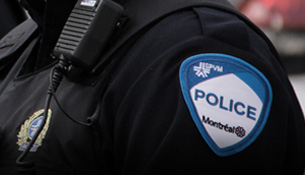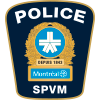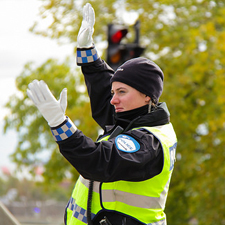
Traffic Rules for Drivers
The safe behaviour of drivers remains an essential component for accident prevention, as it is driver behaviour that causes 80% of collisions.
Traffic rules for cooperative road sharing
- Bring your vehicle to a complete stop at red lights and stop signs
- At red and yellow lights, stop your vehicle before the crosswalk, stop line or edge of the intersection
- Stop your vehicle to allow a pedestrian who has entered the crosswalk to cross the street
- Yield to pedestrians and cyclists when turning at an intersection
- Leave enough room when passing a cyclist
- Before opening the door of a stopped vehicle, ensure you can do so without endangering a cyclist
- When turning at an intersection, drivers of motor vehicles must yield the right of way to cyclists who want to go straight through
- Never pass a school bus or mini bus if its flashing lights are on and its stop sign is extended (unless there is a meridian or other raised physical barrier between you and the bus)
- Stop your vehicle at least five metres from a school bus or minibus when its flashing lights are on
True or False?
When a pedestrian enters a crosswalk located between two intersections, the driver has the right of way.
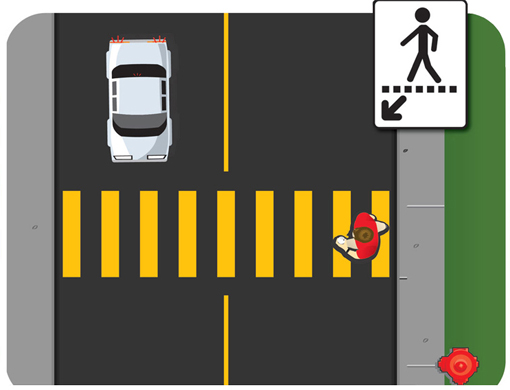
False!
If there is a sign indicating a pedestrian crosswalk, the driver must stop and allow the pedestrian to cross.
True or False?
When a pedestrian enters a crosswalk at an intersection, the driver has the right of way.
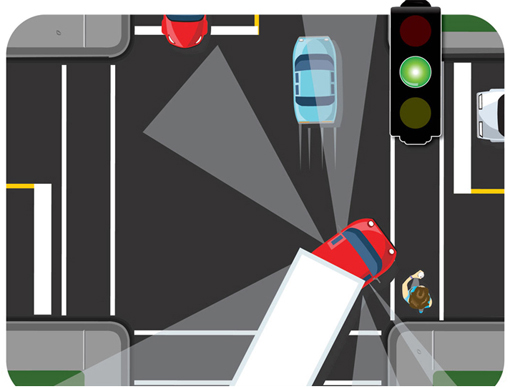
False!
Before turning, the driver must yield to pedestrians who have stepped onto the roadway.
Pedestrians, remember that drivers of heavy vehicles are not always aware of pedestrians getting ready to cross. Because of their height and length, heavy vehicles may have several blind spots that prevent the drivers from seeing pedestrians.
Before you cross, make sure the driver has seen you. Make eye contact!
What to do?
Here are some habits to adopt in order to make sure you remain a safe driver:
Smith system
This system lays down some basic rules for preventative driving. For example: look up and far ahead to widen your field of view, better control unforeseen events and be ready to use defensive manoeuvres.
Signalling your intentions
Signalling is a simple action that is often neglected by drivers. The use of turn signals is extremely important as it makes it possible for other drivers to adapt to us. In fact, the Highway Safety Code requires drivers to announce their moves. Failure to do so can cost you a $100 fine plus expenses.
Blind Spots
Always check blind spots after signalling your intentions and before carrying them out. Using the side mirrors is not sufficient to check blind spots. Practice checking them by turning your head to look.
Possible and real perception
When driving a car, apply the principle of differentiating possible perception from real perception. Drivers should not take anything for granted and always confirm their perception in order to make sure that no dangers lay in wait.
Courtesy
All road users have a duty, especially toward more vulnerable users, to be careful and considerate when travelling on a public highway.
Drivers of road vehicles have a duty to show extra care for more vulnerable users such as pedestrians, cyclists and mobility impaired persons. Vulnerable users, for their part, have a duty to adopt behaviours that enhance their own safety.
Specific rules for motorcyclists
Motorcycle drivers are subject to the same traffic rules as car drivers. However, some rules are specific to them.
Driving between vehicles
No person may drive a motorcycle or a moped
- between rows of vehicles moving in contiguous lanes;
- between the side of the roadway and another vehicle travelling in the same lane; or
- between a vehicle travelling in the same lane and a vehicle parked to the right or left of that lane.
Wearing the helmet
Every person riding on a motorcycle or moped or in a sidecar must wear a protective helmet that complies with the standards prescribed by regulation.
Visual protection
The driver of a motorcycle or moped must also wear visual protection if his protective helmet does not have a visor and he is travelling in a zone where
the maximum authorized speed limit is over 50 km/h.
Passenger
The passenger of a motorcycle or moped shall be seated facing the handlebars and with both feet on the foot-rests while the vehicle is in motion.
Formation en zigzag
Drivers of motorcycles or mopeds driving in groups of two or more in one traffic lane must drive in zigzag formation.
Infractions and penalties
|
Item |
Description of the infraction |
Penalties plus applicable fees |
Demerit points |
|
359 |
Driver of a vehicle who, at a red light, did not stop:
|
$100 |
3 |
|
361 |
Driver of a vehicle who, at a yellow light, did not stop:
|
$100 |
|
|
368 |
Driver of a vehicle who did not stop at a stop sign:
|
$100 |
3 |
|
410 |
Driver of a vehicle who did not stop to allow a pedestrian in the pedestrian crossing to cross the street |
$100 |
|
|
349 |
Driver of a vehicle making a turn at an intersection who does not yield to pedestrians or cyclists |
$100 |
2 |
|
341 |
Driver of a vehicle who passes a bicycle in the same traffic lane when there is not sufficient room to safely pass (1 metre in zones of 50 km/h or less and 1.5 metres in zones of more than 50 km/h) |
$200 |
2 |
|
430 |
Driver or passenger opening the door of a stopped vehicle without making sure that this can be done safely |
$200 |
|
|
460 |
Driver of a vehicle passing or going by a school bus or minibus when:
|
$200 |
9 |
|
460
|
Do not stop your vehicle within5 metersof a school bus or minibus when:
|
$200 |
9 |
|
484 |
Not wearing a protective helmet that complies with the standards prescribed by regulation. |
$ 200 |
3 |
Find out more
Road Courtesy - SAAQ
Let's all share the road... safely (PDF) - SAAQ
Photo radar and red light cameras - Transports Québec

